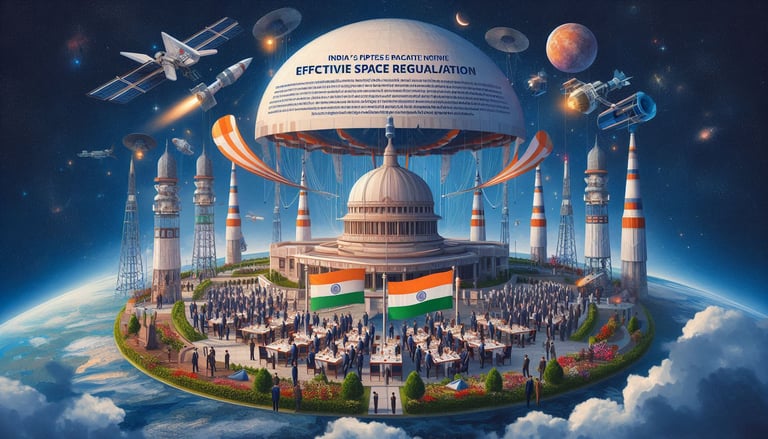Regulating Private Space Ventures: Analyzing India’s Legal Framework For Commercial Space Launches And Operations
Ahaana Chowdhry
Indian Institute of Management, Rohtak
This blog is written by Ahaana Chowdhry, a Third-year law student of Indian Institute of Management, Rohtak


Private Space Projects' Ascent Across the Globe
Space travel has become a hotly contested industry in the last few decades, with companies and individuals vying to be the first to launch satellites, investigate asteroids, and eventually send humans into space. Official space organisations are giving way to commercial space initiatives, which are changing the face of the world's space sector. As a result of the Indian Space Research Organisation's (ISRO) strong space system, India is about to undergo a cultural shift, with private industry playing an ever-more-important role.
Organisations like Blue Origin and SpaceX made waves when they launched rockets and planned human spaceflights, marking the beginning of the privatized space revolution. These businesses have demonstrated that private initiatives may be just as innovative as well as economical as government space endeavours. Studies show that commercial spaceflight can help speed up creation, minimize expenses, and pave the way for a spacefaring community, making it a vital addition to government-led operations. Industrial satellite launches, space excursions, and asteroid extraction firms have all seen a surge in activity because of this influx of private capital in space.
Nations such as the United States and the European Union have taken the initiative to establish thorough regulations that govern commercial space operations while promoting technological advancement and investment.
Indian Commercial Space Initiatives
India has started to let private companies into its space industry, after years of relying on its renowned state space efforts run by ISRO. The nation understands that private sector investment in space advancements can boost India's position in the international space economy. With the launch of IN-SPACe, India's National Space Promotion and Authorisation Centre, the country has taken a giant leap forward in welcoming commercial partnerships into its space industry. As they build systems for satellite deployments alongside additional space flights, organisations like Skyroot Aerospace and Agnikul Cosmos are becoming key participants in India's space battle.
While engaging the private sector has great potential for innovation and economic expansion, it additionally poses risks regarding accountability, legislation, and long-term viability. When it comes to private space operations, India's regulations remain in their early stages, in contrast to the USA's robust legal system.
Present Legal Structure in India
Several regulations and standards regulate space exploration in India, many of which date back. The Remote Sensing Data Policy and the Satellite Communications Policy of India govern the deployment of satellite systems for telecommunications and remote sensing. There is a shortage of understanding of the function of private corporations in space operations under these guidelines, which were mainly developed for government usage.
The creation of the Space Activities Bill marked a major milestone in India's efforts to govern commercial space initiatives. The purpose of this measure is to make companies legally obligated to get licenses to engage in industrial operations. Important matters like responsibility, space debris registration, and guaranteeing adherence to global conventions such as the Outer Space Treaty are included in the law.
Problems with Private Space Exploration Regulation
There are novel problems brought up by private space companies' participation :
1. Licensing and Authorisation: Private space projects in India do not have access to a standardized licensing procedure, in contrast to the United States where such endeavours are subject to the approval of numerous governing agencies. The lack of precise laws causes anxiety, despite IN-SPACe's being entrusted with authorising private space activity.
2. Liability for Space Debris: Countries are held liable for any harm that their space items create according to international accords such as the 1972 Liability Convention. In instances where private organisations launch their own space missions or satellites, liability rules that govern India for such endeavours are still not well defined.
3. The threat of space debris growing into a serious problem due to the expansion of private space operations. Space exploration can have a significant negative effect on the surroundings, and Indian law needs to figure out how to make private enterprises pay for their part in the problem.
4. Safeguarding IPR: The safeguarding of inventions is becoming an increasingly pressing issue in the space development industry since private entities create innovative technology.
The United States, the European Union, and China: An Examination of Comparison
Private space enterprise legislation in India is in its earliest phases, especially when contrasted with fellow spacefaring countries. With the Commercial Space Launch Act, the United States sets the standard for commercial space endeavours and lays out its duties and obligations in detail. The legislation lays out an open road for private companies by including measures for security, accountability, and licensing. The European Union is taking an aggressive stance by pushing its member states to craft space rules that are both nationally relevant and compliant with EU standards. The outcome is a space economy that is both competitive and well-regulated.
The Chinese government, in contrast, has adopted a more centralized strategy. Organisations from the private sector can engage in space exploration, but they are subject to heavy regulatory oversight.
Conclusion
Effective space regulation is urgently required if India is to make the most of its growing private space industry. The Space Activities Bill must be passed into law to establish transparent regulations regarding intellectual property rights, accountability, and licensing. To safeguard national interests, it is important to support public-private alliances that work to innovate while also keeping government oversight.
India can also promote sustainable space-related activities and impose further regulations on space trash if it is serious about sustaining space. Though IN-SPACe is a step in the right direction, India could lag in the space battle if it does not pass strong regulations.
References:
2. https://www.insightsonindia.com/wp-content/uploads/2022/06/Private-Sector-in-Indias-Space-Sector.pdf
3. https://www.hsfc.gov.in/UploadFiles/PageManageFiles/PageFile5397416546982083922.pdf
4. http://indiageospatialforum.org/2012/proceedings/ppt/Malay%20Adhikari.pdf
6. https://aerospace.csis.org/wp-content/uploads/2021/12/20211213_IndiaSpaceBill_Rohera-compressed.pdf
7. https://idsa.in/system/files/book/book_50years-outer-space-treaty-tracing_avlele.pdf
8. https://www.nujs.edu/wp-content/uploads/2022/12/vol-7iss-3-8.pdf
9. https://aerospace.csis.org/the-private-sectors-assessment-of-u-s-space-policy-and-law/
